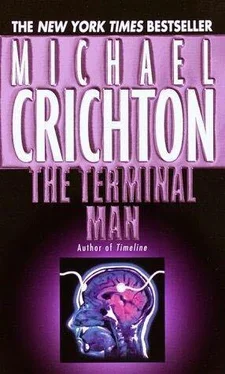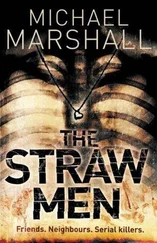Michael Crichton - The Terminal Man
Здесь есть возможность читать онлайн «Michael Crichton - The Terminal Man» весь текст электронной книги совершенно бесплатно (целиком полную версию без сокращений). В некоторых случаях можно слушать аудио, скачать через торрент в формате fb2 и присутствует краткое содержание. Жанр: Фантастика и фэнтези, на английском языке. Описание произведения, (предисловие) а так же отзывы посетителей доступны на портале библиотеки ЛибКат.
- Название:The Terminal Man
- Автор:
- Жанр:
- Год:неизвестен
- ISBN:нет данных
- Рейтинг книги:3 / 5. Голосов: 1
-
Избранное:Добавить в избранное
- Отзывы:
-
Ваша оценка:
- 60
- 1
- 2
- 3
- 4
- 5
The Terminal Man: краткое содержание, описание и аннотация
Предлагаем к чтению аннотацию, описание, краткое содержание или предисловие (зависит от того, что написал сам автор книги «The Terminal Man»). Если вы не нашли необходимую информацию о книге — напишите в комментариях, мы постараемся отыскать её.
The Terminal Man — читать онлайн бесплатно полную книгу (весь текст) целиком
Ниже представлен текст книги, разбитый по страницам. Система сохранения места последней прочитанной страницы, позволяет с удобством читать онлайн бесплатно книгу «The Terminal Man», без необходимости каждый раз заново искать на чём Вы остановились. Поставьте закладку, и сможете в любой момент перейти на страницу, на которой закончили чтение.
Интервал:
Закладка:
Form Q.
Preliminary work was already being done in a number of laboratories and government research units around the country. Advances were being made.
But for McPherson the most exciting prospect was not a superintelligent organic computer. That was just a side product. What was really interesting was the idea of an organic prosthesis for the human brain.
Because once you developed an organic computer - a computer composed of living cells, and deriving energy from oxygenated, nutrified blood - then you could transplant it into a human being. And you would have a man with two brains.
What would that be like? McPherson could hardly imagine it. There were endless problems, of course. Problems of interconnection, problems of location, speculative problems about competition between the old brain and the new transplant. But there was plenty of time to solve that before 1986. After all, in 1950 most people still laughed at the idea of going to the moon.
Form Q. It was only a vision now, but with funding it would happen. And he had been convinced that it would happen, until Benson left the hospital. That changed everything.
Ellis stuck his head in the office door. "Anybody want coffee?"
"Yes," McPherson said. He looked over at Mor.
"No," Morris said. He got up out of his chair. "I think
I'll replay some of Benson's interview tapes."
"Good idea," McPherson said, though he did not really think so. He realized that Morris had to keep busy - had to do something, anything, just to remain active.
Morris left, Ellis left, and McPherson was alone with his multicolored charts, and his thoughts.
It was noon when Ross finished with Anders, and she was tired. The Scotch had calmed her, but it had intensified her fatigue. Toward the end she had found herself stumbling over words, losing track of her thoughts, making statements and then amending them because they were not exactly what she had intended to say. She had never felt so tired, so drugged with fatigue, in her life.
Anders, on the other hand, was maddeningly alert. He said,
"Where do you suppose Benson is now? Where would he be likely to go?"
She shook her head. "It's impossible to know. He's in a post-seizure state - post-ictal, we call it - and that's not predictable."
"You're his psychiatrist," Anders said. "You must know a lot about him. Isn't there any way to predict how he'll act?"
"No," she said. God, she was tired. Why couldn't he understand? "Benson is in an abnormal state. He's nearly psychotic, he's confused, he's receiving stimulations frequently, he's having seizures frequently. He could do anything."
"If he's confused…" Anders let his voice trail off.
"What would he do if he was confused? How would he behave?"
"Look," she said, "it's no good. It's no damned good, working that way. He could do anything."
"Okay," Anders said. He glanced at her briefly, and sipped his coffee.
Why couldn't he just let it go, for Christ's sake? His desire to psych out Benson and track him down was ludicrously unrealistic. Besides, everybody knew how this was going to turn out. Somebody would spot Benson and shoot him, and that would be the end of it. Even Benson had said-
She paused, frowning. What had he said? Something about how it would all end. What were his exact words? She tried to remember, but couldn't. She had been too frightened to pay close attention.
"These are the impossible ones," Anders said, getting up and walking to the window. "In another city, you might have a chance, but not in Los Angeles. Not in five hundred square miles of city. It's bigger than New York, Chicago, San Francisco, and Philadelphia put together. Did you know that?"
"No," she said, hardly listening.
"Too many places to hide," he said. "Too many ways to escape - too many roads, too many airports, too many marinas. If he's smart, he's left already. Gone to Mexico or to Canada."
"He won't do that," she said.
"What will he do?"
"He'll come back to the hospital."
There was a pause. "I thought you couldn't predict his behavior," Anders said.
"It's just a feeling," she said, "that's all."
"We'd better go to the hospital," he said.
The NPS looked like the planning room for a war. All patient visits had been canceled until Monday; no one but staff and police were admitted to the fourth floor. But for some reason, all the Development people were there, and they were running around with horrified looks on their faces, obviously worried that their grants and their jobs were in jeopardy. Phones rang constantly; reporters were calling in; McPherson was locked in his office with hospital administrators; Ellis was swearing at anyone who came within ten yards of him; Morris was off somewhere and couldn't be found; Gerhard and Richards were trying to free some telephone lines so they could run a projection program using another computer, but all the lines were in use.
Physically, the NPS was a shambles - ashtrays heaped with cigarette butts, coffee cups crumpled on the floor, half-eaten hamburgers and tacos everywhere, jackets and uniforms thrown across the backs of chairs. And the telephones never stopped ringing: as soon as anyone hung up on a call, the phone rang again instantly.
Ross sat with Anders in her office and went over the Miscellaneous Crime Report, checking the description of Benson. The description was computerized, but it read out fairly accurately: male Caucasian black hair brown eyes 5'8" 140# 34 years old. Personal oddities: 312/3 wig, and 319/1 bandages on neck. Thought to be armed with: 40/11 revolver. Trademarks: 23/60 abnormal act (other) - perseveration.
Reason for crime: 23/86 suspect insane.
Ross sighed. "He doesn't really fit your computer categories."
"Nobody does," Anders said. "All we can hope is that it's accurate enough to allow somebody to identify him. We're also circulating his picture. Several hundred photos are being run off now, and distributed around the city. That'll help."
"What happens now?" Ross said.
"We wait," he said. "Unless you can think of a hiding place he'd use."
She shook her head.
"Then we wait," he said.
It was a broad, low-ceilinged, white-tiled room, lit brightly by overhead fluorescent lights. Six stainless-steel tables were set out in a row, each emptying into a sink at one end of the room. Five of the tables were empty; the body of Angela Black lay on the sixth. Two police pathologists and Morris were bent over the body as the autopsy proceeded. Morris had seen a lot of autopsies in his day, but the autopsies he attended as a surgeon were usually different. In this one, the pathologists spent nearly half an hour examining the exterior appearance of the body and taking photographs before they made the initial incision. They paid a lot of attention to the external appearance of the stab wounds, and what they called a "stretch laceration" appearance to the wounds.
One of the pathologists explained that this means the wounds were caused by a blunt object. It didn't cut the skin; it pulled it and caused a split in the taut portion. Then the instrument went in, but the initial split was always slightly ahead of the deeper penetration track. They also pointed out that skin hair had been forced down into the wounds in several places - further evidence of a blunt object producing the cuts.
"What kind of blunt object?" Morris had asked.
They shook their heads. "No way to know yet. We'll have to take a look at the penetration."
Penetration meant the depth that the weapon had entered the body. Determining penetration was difficult; skin was elastic and tended to snap back into shape; underlying tissues moved around before and after death. It was a slow business. Morris was tired. His eyes hurt. After a time, he left the autopsy room and went next door to the police lab, where the girl's purse contents were spread out on a large table.
Читать дальшеИнтервал:
Закладка:
Похожие книги на «The Terminal Man»
Представляем Вашему вниманию похожие книги на «The Terminal Man» списком для выбора. Мы отобрали схожую по названию и смыслу литературу в надежде предоставить читателям больше вариантов отыскать новые, интересные, ещё непрочитанные произведения.
Обсуждение, отзывы о книге «The Terminal Man» и просто собственные мнения читателей. Оставьте ваши комментарии, напишите, что Вы думаете о произведении, его смысле или главных героях. Укажите что конкретно понравилось, а что нет, и почему Вы так считаете.









